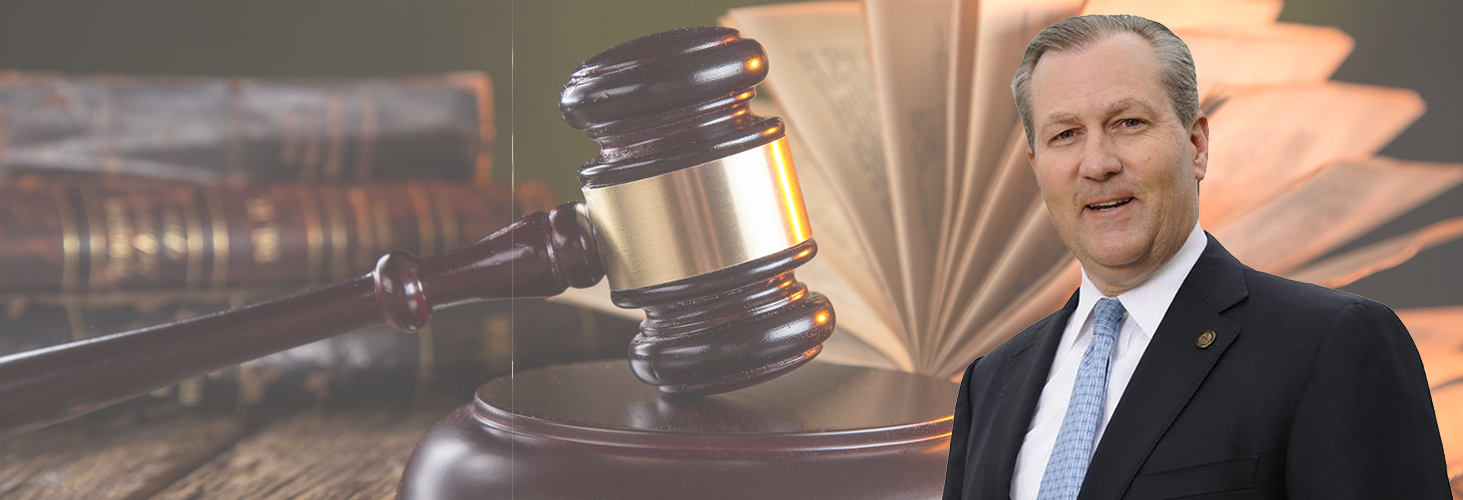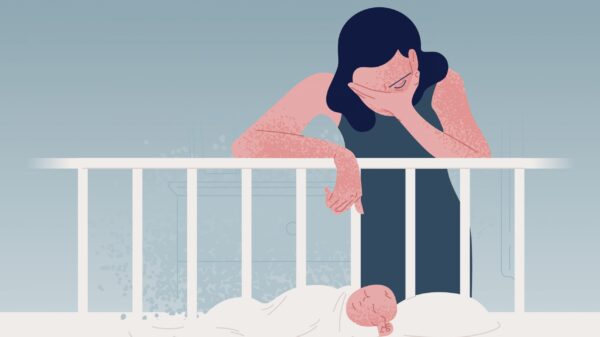By Bill Britt
Alabama Political Reporter
OPELIKA—On day one of the State of Alabama vs. Michael G. Hubbard, there were no fireworks, but there was some insight into the days ahead, and a little more backstory on the 23 counts of felony corruption for which Hubbard stands accused.
Those notable in attendance included Rob Riley, Rep. Pebbling Warren, Rep. Barry Moore and attorney Baron Coleman.
The day began at 9:00, with the jury being seated at 10:00. The Attorney General’s Special Prosecution Division Chief, Matt Hart, gave opening statements for the Prosecution.
Two defense attorneys, who do not necessarily share a very high opinion of Hart, agreed that he had given a well-structured and compelling opening statement.
In contrast to his reputation as a forceful, even bullying prosecutor, Hart’s opening was a calm, friendly, detailed lesson on how State government works, what are ethics laws, why we have them, and a point-by-point narration of the charges against Hubbard.
Perhaps the only great surprise was when an attorney told the Alabama Political Reporter that Hubbard had a placed a plea deal on the table, prior to the begining of the trial. According to this attorney, who asked to remain anonymous, Hubbard has made an offer to the State, but they have not accepted at this time.
It is important to remember that a plea offer stays in effect until the jury comes back in with a verdict.
During Hart’s presentation, some jurors could be seen leaning forward, nodding yes, and taking notes. This was especially true when Hart detailed how Hubbard was paid to add language to the Medicaid budget for his client, American Pharmaceutical Cooperative Inc. (APCI). Some jurors seemed shocked when Hart revealed that Hubbard had raised $1.5 million for Craftmaster Printer, because he needed more than $300,000 to pay delinquent withholding taxes. They also paid close attention when he described the many schemes Hubbard used for his own financial gain.
Former Attorney General, Bill Baxley, presented the opening statements for the Defense. In his usual style, Baxley blustered, stammered and offered up a corn-pone-rich narrative. While calling the charges against Hubbard “gobbledy-goop” and “mumbo jumbo,” he offered up a narrative that Hubbard was a business man and a part-time politician, who needed to make money. He also said that other lawmakers had, in the past and present, held the same consulting jobs as Hubbard.
He spent a particularly long 30 minutes recounting Hubbard’s rise to power, starting as a cub scout who dreamed of being a radio announcer, to a humble family man who so loved Bob Riley, that he even named his first child after him.
Baxley spoke about how Hubbard met his wife, Susan, their courtship and marriage, Mrs. Hubbard’s education, and rise to full professorship at Auburn University.
During opening statements, Baxley painted a picture of how Hubbard’s hard work and talent had gone a long way to helping Hershal Walker and Bo Jackson win the Heisman Trophy. He said while those players had great talent, and had put for an enormous effort, it was Hubbard’s packaging that played an instrumental role in them winning the coveted trophy.
He concluded that he would prove beyond a reasonable doubt that Hubbard was innocent of all charges against him. Then he said, “Let this man and his family go back to living their life (lives) in peace.”
During the Baxley presentation, jurors did not seem to be as attentive, fewer notes were taken and they seemed tired. Of course, Hart’s statement was before lunch and most of Baxley’s was after.
Two witnesses were called: John Ross and Tim Howe, both from Swatek, Howe and Ross. Deputy Attorney General John Gibbs, who came out of retirement to fill out the Prosecution team, led the direct questioning of the witnesses. Ross was first in the jury box. He was questioned about his time as Executive Director for the Alabama Republican Party. Ross was confident and polite and answered questions without hesitation. The Prosecution questioned Ross about how the Party came to decide to use Hubbard’s business interests, Craftmaster Printers, Inc. and Network Creative Media. He answered that this was a strategy conceived by Hubbard to use economies of scale to reduce costs and maximize use of campaign dollars. Ross said that Hubbard had made the decision to use his companies, but that he agreed that it was a good idea.
One of the charges against Hubbard was for funneling money from the ALGOP through Florida-based Majority Strategies and back to his company, Craftmaster Printers. Ross said he was not initially aware of this arrangement, but later became aware because he was informed by Hubbard.
The State also questioned Ross about his company’s lobbying agreement with APCI during the 2013 Legislative Session. Ross revealed that he was the primary lobbyist from his firm, representing APCI in a grass roots campaign to persuade lawmakers to give the company a monopoly over the Medicaid Pharmacy Benefits Program. Hubbard has been accused of placing language into the Medicaid budget to benefit APCI which was paying him $10,000 per month for his “consulting” work. Ross stated that on the night in which a vote was to be cast to pass the General Fund Budget containing the favorable language, he was alerted by lobbyist Ferrell Patrick that Hubbard also had a lucrative contract with APCI. Ross’ company had been hired by Patrick to lobby for the pharmacy group without informing them of the potential conflict of interest. Ross said once he understood Hubbard’s relationship with APCI, he immediately alerted his partners and asked for a meeting with Hubbard’s Chief of Staff, Josh Blades. The meeting took place in the Speakers conference room on the fifth floor of the State House. In attendance were Ross, Blades and Howe. During the meeting, his concerns over Hubbard’s involvement with the company were expressed to Blades.
Next up, was Tim Howe, who testified about his companies, Howe Group and SRM Media’s, involvement in a scheme, whereby money to purchase advertising was paid to his company by the ALGOP and then immediately transferred to Hubbard’s company, Network Creative Media. Howe seemed to be both angry and hesitant about having to testify against his close colleague, Hubbard. He admitted under oath that while he received five percent of the money from ALGOP, he did no work. He said the money went directly from him to Hubbard. He intimated that Hubbard was angry when he learned that Howe was taking five percent, but later agreed that Howe should keep the small percentage for his troubles. Howe was also questioned about APCI. He said that when he and Ross met with Josh Blades, he said he told them that this could mean ethics problems for them all.
On cross examination of both men, Baxley asked about the quality of work performed by Craftmaster and Network Creative Media, and both agreed it was good.
He also suggested that Howe received his five percent because he was doing so much “other” work for the ALGOP. On redirect, Howe admitted to Prosecutor Gibbs that he did not receive that five percent for the other work he was doing for the ALGOP.
That concluded Day One of the Hubbard Trial.
Tomorrows witnesses are expected to be Barry Whatley, president of Craftmaster; Josh Blades, Hubbard’s former Chief of Staff; Jason Isbell, former Hubbard’s former legal advisor; Jeff Woodard, clerk of the House; and Representative Steve Clouse. Others may be called as well.

















































